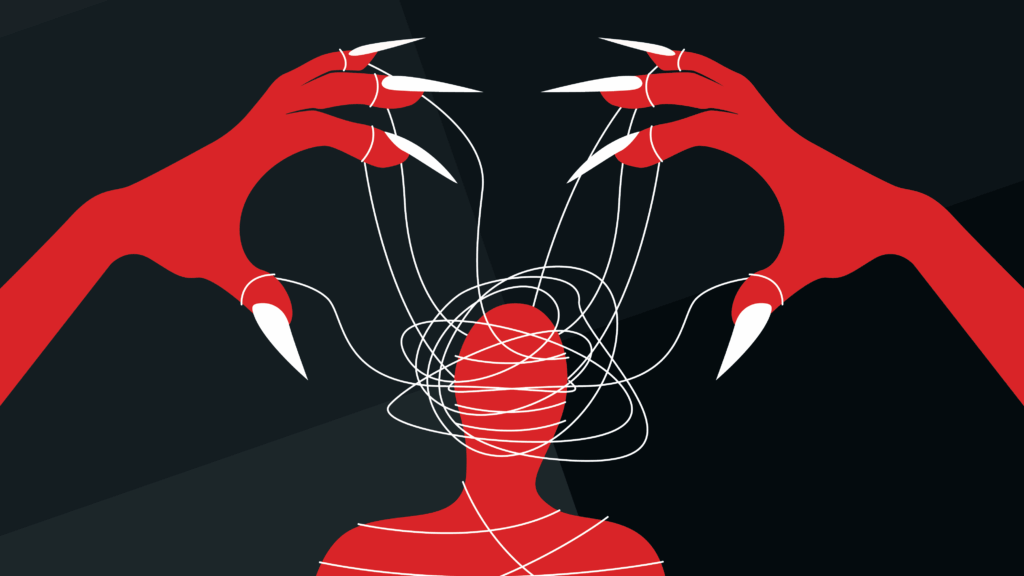
Why do people believe in demonic possession? This spooky season, we explore the psychology behind paranormal beliefs related to demons: possession and exorcism.
On episode 135 of The Science of Personality, cohosts Ryne Sherman, PhD, and Blake Loepp spoke with Chris French, PhD, professor emeritus and former head of the Anomalistic Psychology Research Unit at Goldsmiths, University of London.
“People report weird experiences in every society. Paranormal beliefs tell us something important about human psychology,” said Chris. A self-proclaimed skeptic and atheist, Chris studies and has published widely on anomalistic psychology.
Belief in demonic possession and exorcism persists strongly across history, culture, and religion. Let’s consider some psychological reasons.
Psychological Reasons for Paranormal Beliefs
According to Chris, people think that demons exist for many reasons, especially due to religious belief systems. “We all bring our belief systems to situations we try to make sense of,” he explained. Chris referenced Christian fundamentalism and Roman Catholicism as prevalent religions with global influence that teach about demons. Circumstances regarding possession and exorcism appear to reinforce these teachings. Thus, demonic possession can seem to be the most obvious explanation for certain human behavior.
Besides religion, Chris referred to many other reasons for paranormal beliefs about demonic possession.
Philosophical Worldview
Most people feel intuitively as if their minds are separate from their bodies. This philosophy, called mind-body dualism, raises the possibility that a separate external spirit could take control of the body.
Psychiatric or Neurological Illness
Mental illness can be mistaken for possession. Some symptoms of epilepsy, schizophrenia, Tourette’s syndrome, and other medical conditions have the potential to resemble demonic possession to an observer.
Sociocognitive Theory
This approach to understanding possession explains sudden possession behaviors as a learned role or behavior. The person may genuinely feel as though a possessing spirit is directing their behavior. Examples of these learned behaviors include hypnotic regression, formal rituals, or psychic mediumship.
Deliberate Hoax
Another possibility is that someone acts as if they are possessed to seek attention. This deceptive attention-seeking behavior could appear as a personality shift, convulsions, glossolalia (unintelligible vocalization), and self-inflicted physical marks—all of which depend on culturally specific signs of demonic possession.
Behavior Modification
A person’s community members might label them as possessed to force them to undergo an exorcism ritual to correct their behavior. The ritual could cause pain, permanent physical damage, or death.
If the practice of exorcism isn’t beneficial, why does it persist? Well, there are some subtle advantages. A successful exorcist gains significant social status. A community reinforces its belief system and social cohesion. And a person who is labeled as being possessed has both an explanation for past socially unacceptable behavior and a path for returning to harmony with their community.
“Often, the people labeled as possessed are relatively powerless,” Chris noted. He referred to historical outbreaks of possession in isolated communities such as cloistered monasteries and geographically remote tribes. Possession would enable a group with little power to gain attention and say or do things that would be socially unacceptable by attributing their behavior to the demon.
Cultural Perceptions of Demonic Possession
Cultural narratives shape the way people experience or interpret possession, often in an exaggerated way. The iconic 1973 horror film The Exorcist had a huge cultural impact on what we think are signs of demonic possession. Chris compared the movie’s fictional portrayal with a live exorcism broadcast in the United Kingdom. “People tuned in expecting to see rotating heads and projectile vomit,” he said. Instead, the exorcist only spoke gently to the person they were exorcising. “There’s a whole spectrum of different behaviors, depending upon what is expected within that religious community,” Chris explained.
Dramatic depictions of demonic possession both influence and are influenced by cultural narratives. Paranormal beliefs often persist due to cultural factors, including the concept of psychiatry as exorcism. Chris referenced the 1957 film Three Faces of Eve, based on the life of Chris Costner Sizemore (1927–2016), who was diagnosed with dissociative identity disorder (DID) in the 1950s. Afterward, DID diagnoses increased, similar to how reports of demonic possession can increase reporting nearby, even leading to mass psychogenic illness (e.g., the Salem witch trials).
A True Story of Exorcism
Unconscious biases and mistaken perception about behavior attributed to demonic possession can lead to tragedy. “Even if the case history is described with a hundred percent sincerity, it doesn’t mean it’s a hundred percent accurate,” Chris cautioned. He mentioned Anneliese Michel (1952–1976), who died of malnutrition and dehydration after numerous attempted exorcisms. Michel’s parents and two priests were convicted of negligent homicide. They believed they were helping Michel with symptoms of her psychiatric illnesses.
“Ultimately, we’re all trying to make sense of what it means to be human,” Chris said. “These are fundamental questions about the nature of consciousness.”
Why People Believe in Demonic Possession
Based on evolutionary theory, human brains are primed for detecting potential threats. If an ambiguous rustling in the bushes could be a saber-toothed tiger, running away is the best option, whether the tiger is there or not. Our brains assume that things happen because something with intentions toward us made them happen. ("A tiger wants to eat me.") From that assumption, Chris explained, it’s a short step to the belief that a spiritual being is making things happen to us. ("A demon wants to control me.")
So, is belief in demonic possession likely to decline or persist? “Our brains are not that different from the brains of our ancestors from millennia ago, so we’re prewired to develop certain beliefs,” Chris said. “It’s going to be with us certainly for the foreseeable future and probably for much longer.”
Listen to this conversation in full on episode 135 of The Science of Personality. Never miss an episode by following us anywhere you get podcasts. Cheers, everybody!